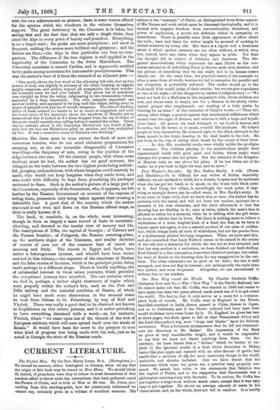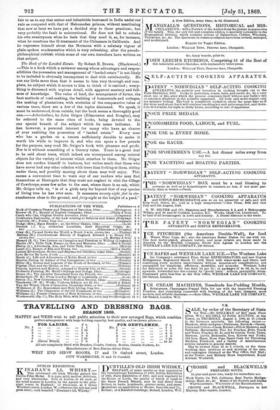Our New Way round the World. By Charles Carleton (Sampson
Low and Co.)—The " New Way " is the Pacific Railroad, but we cannot make out that Mr. Coffin, who started in 1866 and seems to- have spent less than two years abroad, made much use of it to get round the world. The fact is, that it only servos as a name for a common- place book of travels. Mr. Coffin went to England in the Persia, travelled overland to India, thence passed to China, theist* to Japan, and so to California, and if the Pacific railroad had been open then would doubtless have come home by it. To England he gives bat two or three pages, but finds space to tell us that Westminster Abbey and the Lord Chancellor's wig were "drags and blocks" upon the Reform movement. What a fortunate circumstance that he did not communi- cate his discovery to Mr. Beaks l His impression of the East he gives at very considerable length, and it would be ungrateful to say that we have not learnt anything from them. On the contrary, we have learnt that a " dorian," which we hasten to ex- plain to the ignorant reader is a fruit which flourishes in Malay, tastes like pine-apple and custard with an after-flavour of garlic, but smells like a mixture of all, the most unsavoury things in the world, asafoetida and skunks included. Also we have learnt that the Americans drink none but green tea, a practice very properly cen- sured. We attach less value to the statements that Babylon was the capital of Persia, and to the suggestion that Cincinnatus was a philosopher contemporary with Socrates. To be serious, Mr. Coffin leas put together a large book without much cause, except that it was very easy to put together. He shows an average amount of sense in his observations, and, on the whole, does not fail in candour. It is hardly
fair to us to say that suttee and infanticide increased in India under our rule as compared with that of Mahomedan princes, without mentioning that now at least we have put a decided stop to those practices; but very probably the fault is unintentional. He does not fail to rebuke his own countrymen when he feels that they need it, as, for instance, when he mentions the ill-treatment of the Chinamen in California. And he expresses himself about the Mormons with a salutary vigour of plain-spoken condemnation which is very refreshing, after the pseudo- philosophical rubbish which some of our own travellers have written on that subject.































 Previous page
Previous page